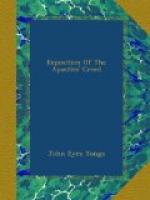The valleys of the Nile, of the Euphrates, and of
the Tigris have revealed facts for the theologian’s
benefit that are almost exhaustless. In the Egyptian
Book of the Dead, and in the religious hymns and the
ritual of which they formed part in the sacred literature
of Babylonia, there is proof that four thousand years
ago hymns were sung in honour of the gods, and prayers
were offered to propitiate them and secure their favour.
But belief in God had place long before these hymns
were sung or these prayers offered. This is shown
by the existence of words in the most ancient hymns,
prayers, and inscriptions which could not have been
used unless the ideas which they conveyed had already
existed in men’s minds. These words—some
of which are preserved in modern tongues—when
traced to their roots, help greatly to explain the
character of early religious thought, and prove the
existence of a widely diffused belief in the Divine
Being and His government. They serve as confirmation
of a belief, which is in harmony with many facts,
that God had revealed Himself to humanity before He
furnished the revelation which has come down to us.
Words are not originated by accident. They are
expressions of real existences, and before they found
place in hymns or prayers the ideas which they denoted
must have been matters of faith or knowledge to those
who used them. Before man is found professing
faith in pagan deities some idea of God must have
existed in his mind. Men did not like to retain
God in their knowledge, and so the idea of the Divine
became perverted, and in its first simplicity was
lost, and the multitude followed numberless shadows
all illusory and vain. Still, there lingered
remnants and traditions of belief in a Divine Creator
and Governor which must have originated in such a
primeval revelation as the book of Genesis records.
We find there the statement that God revealed Himself
to our first parents by direct intercourse. They
heard and saw and talked with God. They therefore
knew of the existence of God by personal perception,
and the ideas they held regarding Him were founded
on His own manifestation of Himself.
Closely connected with this consciousness is the sense
of responsibility universally prevalent. There
is a law written on the heart of every rational human
being, under the guidance of which he recognises a
distinction between good and evil, right and wrong.
He possesses a faculty to which the name of conscience
has been given, that convicts him of sin when he violates,
and approves his conduct when he conforms to, its
dictates. However much different peoples and different
ages may be at variance in their particular ideas
of what is right and what is wrong, the conception
itself has place in all of them. There are certain
fundamental notions as to what is just and what is
unjust, what is virtuous and what is vicious, that
find universal or all but universal acceptance.
This power of distinguishing between right and wrong




